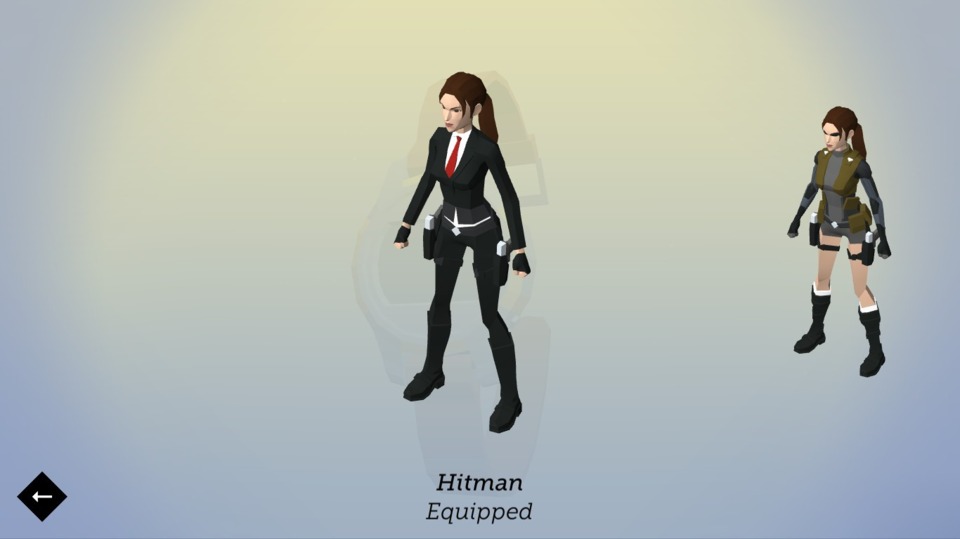Indie Game of the Week 25: Lara Croft Go
By Mento 1 Comments

I need to get out of the habit of buying new Indie games for the sake of this feature, because the entire intent from the very beginning was to bring my Steam backlog to heel. The May features of yesteryears didn't do nearly enough to stem the tide that is collectively made up of all the cheap bundles and Steam sale purchases that I invariably lack the willpower to resist. I mention this because this week's game is a last-second replacement which I literally bought today for a game that doesn't run on this PC that I bought two weeks ago - I'll reiterate that I have a Steam shame pile over 100 games long, and those are just the games I badly want to check out.
But none of that should be laid at Lara Croft Go's feet, the game that makes what I thought was an odd distinction between Tomb Raider and the name of its heroine when coming up with its title (as opposed to Hitman Go and Deus Ex Go, neither of which namedrops their protagonist). I realized there was a reason for this: at some point, Tomb Raider effectively split into two different taxonomies. The first, Tomb Raider, comprises the big AAA games for the current generation of consoles that feature a vulnerable, younger Lara Croft as she learns the ropes (and the pulling and climbing of said ropes) of the tomb raiding biz while also gunning down thousands of surly men with beards because the devs Crystal Dynamics decided to come full circle with Uncharted's incongruous murder-a-thons. (To digress a moment, it didn't feel too long ago where Lara would kill maybe five human beings at most in her games, and they all had dumb themes like "rollerskating kid" and "cowboy".) Anyway, the other genus of Tomb Raider involve those co-operative top-down action-puzzle games with names like "Lara Croft and the Temple of Osiris" and "Lara Croft and the Guardian of Light". These were more carefree, more "adventure serial" takes on the archeological heiress in the style of Indiana Jones and, like Spielberg's three good movies and one bad one in that franchise, didn't take themselves at all seriously. What's more, they emphasized the traps and puzzle-solving of the Tomb Raider franchise rather than the merciless gunning down of people with families and animals on the endangered list.

Lara Croft Go definitely follows in the spirit of those other Lara Croft games, right down to its minimalist look and isometric perspective. Each level is created like a board game, where time only moves when Lara does. If a boulder starts rolling down a path, it'll only move a space when Lara moves a space. This allows the player to easily predict the motion of everything on the screen, ostensibly (but certainly not in practice) minimizing the amount of times the player will be caught unawares by a fatal trap or unwinnable dead end state. The game's few animal enemies also follow some basic rules to work around: snakes will kill Lara if she approaches them from the front, though will generally stay put; giant lizards will pursue Lara once spotted, usually staying two spaces away; spiders will move automatically on a patrol route, killing Lara if she happens to be in the way of their patrol, etc.. Everything moves and functions like clockwork, and it's down to the player to determine the correct course through to the exit by observing all the rules of the realm that they've picked up.
The game also looks great. I guess this minimalist look started with Hitman Go, where Agent 47 and his many anonymous armed foes looked more overtly like chiseled game pieces on a board, but Lara Croft Go adapts that aesthetic into these attractive dioramas that do a lot with its basic, untextured polygonal models. In addition to reaching the end of each level, the player is also tasked with the optional collecting of jewels and relic pieces from vases in the background and foreground, and these can be carefully hidden in the various outcroppings and flora that frame each of the board-like levels. They're almost more like hidden object puzzles than the more overt type of map-following collectibles I'm used to in modern open-world games, and I'm having a surprising amount of fun picking them out of the tableaus the game presents. Fortunately, if you miss one, the game lets you revisit any specific board to try to find them again, and each of these boards are these bite-sized morsels that you can fly through in a minute or two once you know its solution.
Currently, I've completed the "core" game and am about to embark on the super-challenging bonus dungeons which I assume got added sometime after its initial release on iOS devices back in 2015. At around three hours registered on Steam, it's definitely not a long game - though it remains to be seen just how long these bonus dungeons take - but it's expertly paced in that doesn't let any one of its puzzle elements outstay its welcome with too many iterations. My favorite part of any Tomb Raider game has always been entering a room alone with a bunch of pillars, switches and mechanisms and trying to figure out the path ahead, and this game scratches that itch perfectly. Let's hope the other four Steam games I bought today are anywhere near this good (I know, I know, I have a sickness).
Rating: 5 out of 5.
(And yes, it's been pointed out to me that a Square Enix developed and published game isn't exactly "Indie", but we're all still trying to figure out the proper nomenclature for "sufficiently small and usually digital only game". Maybe "D-game", since arbitrary letters are a big deal around here?)
| < Back to 24: Ziggurat | > Forward to 26: Wuppo |
